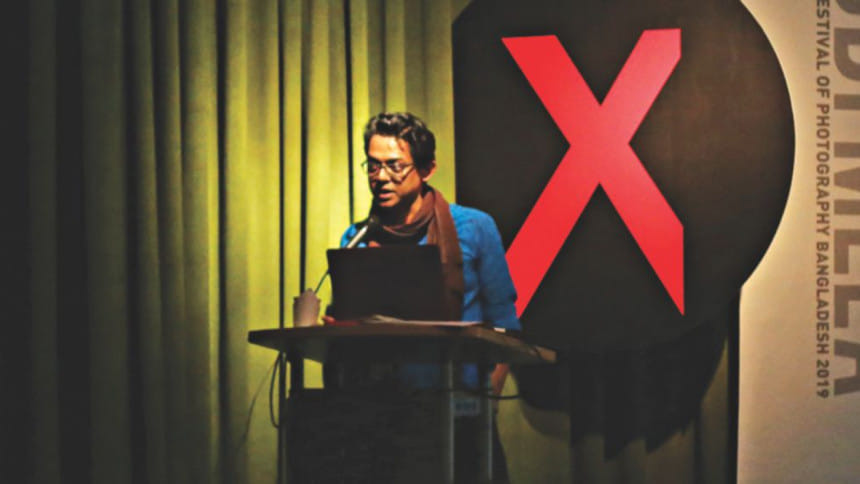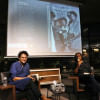Naeem Mohaiemen talks history, visual art and film at Chobi Mela X

Academic and artist Naeem Mohaiemen, who was nominated last year for the UK's prestigious Turner Prize (the Prize eventually went to Scotland's Charlotte Prodger), is one of the most informed people of our time. Working obsessively on the history of Bangladesh, the artist is sensitive to social changes, as well as the political climate of the world, which is often reflected through his works. Recently at a talk during Chobi Mela X, Naeem Mohaiemen exhibited clips from three of his films titled United Red Army, Two Meetings and a Funeral and Tripoli Cancelled at the Goethe-Institut Bangladesh.
A short clip from United Red Army (2011), which was about a plane hijack by the Japanese Red Army in 1977, was shown at the beginning of the session. The now defunct Japanese Red Army were allies with many forces, including the Palestinian cause in the 1970s. The Red Army took up plane hijacking as their form of militant actions. The reason that they were particularly successful at hijacking, as depicted in the film, is because Arab passengers were more likely suspects, as opposed to Japanese tourists, for the security cordon. The plane was hijacked from India and landed in Bangladesh until the peaceful resolution.
The clip shown in the session, was mostly in darkness, and included a conversation between the hijacker and air force negotiator. In the conversation, the part where the hijacker mistakenly asks for alcohol, among many things, provoked much laughter in the audience. The artist went on to talk about the response that the film received from different parts of the world. “The laughter here in Dhaka is of a different register. That request means something different when the film is shown elsewhere,” said Mohaiemen.
Another featured film of the session, Two Meetings and a Funeral (2017) was about two meetings - the non- aligned movement meeting in Algiers, Algeria in 1973, and the Organisation of Islamic Cooperation meeting in Lahore, Pakistan in1974. The film was shot in New York, Algeria and Bangladesh. A short excerpt of the film was exhibited that focused on the Bangabandhu International Conference Center, previously known as Bangladesh China Friendship Conference Center, and before that the “NAM Shammelan Center”. It was built for a non-aligned movement meeting in Dhaka, that never took place. Even though NAM did not happen, the name came into common use. A trade fair was going on during the time the film was shot, which creates a crowded intensity on screen.
The film is usually installed in museums and displayed on three separate screens using three projectors. Structural opportunities of video encouraged the artist to go past the usual arrangements. “When we were filming in Algeria, everything we looked at was so vast, suggested that it can only be shown in panorama,” explained Mohaiemen, “Hence, we decided to utilise the larger span, and use juxtaposition of screens.” He then ended the session, displaying a clip from his fiction film Tripoli Cancelled (2017), about a man who lives in an airport for ten years.
As he showed these clips, he also talked about his philosophy of producing art. He believes that artists should not explain too much of their work. “For everything I do in Bangladesh, or anyone else does, we should acknowledge that we are a part of a community. It's important to continuously acknowledge the people with whom our work is in conversation. Nobody makes work alone, it's always in dialogue with many,” added the artist.
Naeem Mohaiemen's projects can be seen during Chobi Mela at Abdur Razzaq Bidyapeeth, House 60, Road 7A, Dhanmondi.

 For all latest news, follow The Daily Star's Google News channel.
For all latest news, follow The Daily Star's Google News channel. 








Comments